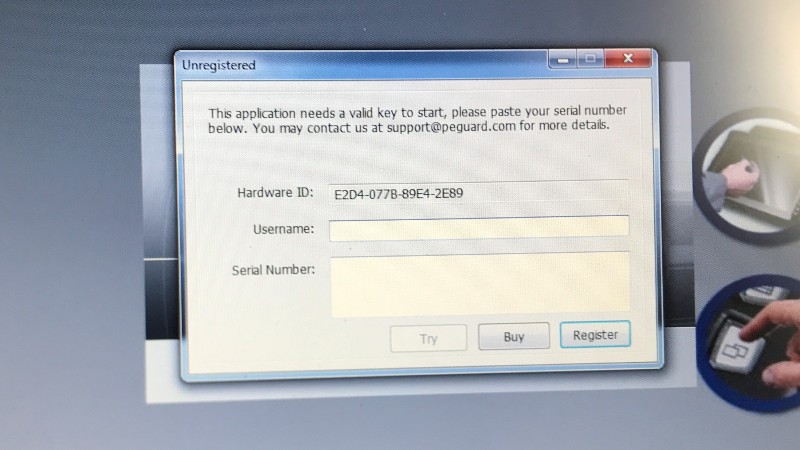For automotive professionals and enthusiasts seeking diagnostic solutions for Mercedes-Benz vehicles, Xentry Diagnostics is an indispensable tool. The allure of more affordable, Chinese-manufactured clones of Xentry systems is understandable. However, it’s crucial to be aware of hidden risks associated with these clones, particularly concerning software locking mechanisms like PEGuard (also known as Zprotect). While the term “Xentry Diagnostics Key Generator” might lead you to believe in easy workarounds, the reality is more complex and potentially detrimental to your operations.
The primary issue with many Chinese Xentry clones isn’t just about software activation or needing a “xentry diagnostics key generator.” It’s the embedded PEGuard software designed to prevent unauthorized use and software modifications. This protection system is often pre-loaded onto the hard drives (HDDs) or solid-state drives (SSDs) that come with these clone systems.
 PEGuard Lock Screen on Chinese Xentry Diagnostics Clone: Software Protection Prevents Xentry DAS Access, even with Xentry Diagnostics Key Generator
PEGuard Lock Screen on Chinese Xentry Diagnostics Clone: Software Protection Prevents Xentry DAS Access, even with Xentry Diagnostics Key Generator
The Functionality and Frustration of PEGuard
PEGuard’s primary function is to detect and prevent software copying or cloning. If you attempt to backup the drive or alter the software in any way, PEGuard can activate, effectively locking you out of Xentry DAS. Instead of accessing your diagnostic tools, you’ll be greeted with a screen similar to the image above, rendering the system unusable.
What’s particularly frustrating is that this PEGuard protection often operates on a trial or expired license. This means that even if you haven’t attempted to tamper with the software, the system can lock up after a certain period, displaying the same error message and blocking access to Xentry DAS. This time-out issue can occur unexpectedly, disrupting your workflow and potentially leaving you stranded mid-diagnosis.
Real-World Encounters with PEGuard Locks
Personal accounts from users who have purchased these Chinese clones highlight the real-world impact of PEGuard. One user recounted an experience where their Chinese clone system locked up unexpectedly. Believing they had avoided triggering the lock by not copying or modifying the drive, they were still faced with system failure due to PEGuard’s time-out feature. This led to the additional expense of purchasing a replacement HDD to regain access to a working system.
In a subsequent attempt to mitigate this issue, the same user purchased another HDD from an online vendor, specifically inquiring about PEGuard. Despite assurances from the seller and their technician that the drive was free of locking software, the user received a contradictory message after purchase stating that copying the drive to an SSD was “Not allowed.” This discrepancy strongly suggested the presence of PEGuard, leading to a request for a refund due to misrepresentation and concerns about counterfeit software. Fortunately, in this instance, a full refund was issued, and the user retained the problematic drive, highlighting the deceptive practices sometimes employed by sellers of these clones.
Protecting Yourself from PEGuard and Counterfeit Software
If you are considering purchasing a Chinese Xentry Diagnostics clone, it’s essential to exercise caution and ask the right questions before committing to a purchase. Directly inquire with the seller: “Is the HDD/SSD loaded with PEGuard or similar software that prevents backing up the drive?” Their answer, or lack thereof, can significantly inform your decision.
Be wary of deals that seem too good to be true, and remember that purchasing counterfeit software carries inherent risks. While the initial cost savings of a clone might be appealing, the potential for software locks, unreliable performance, and lack of support can outweigh the benefits. Instead of searching solely for a “xentry diagnostics key generator” to bypass potential issues, focus on understanding the source and security of the software you are acquiring. Prioritize reputable suppliers and consider the long-term reliability and functionality of your diagnostic tools to avoid costly disruptions and ensure accurate and efficient vehicle servicing.